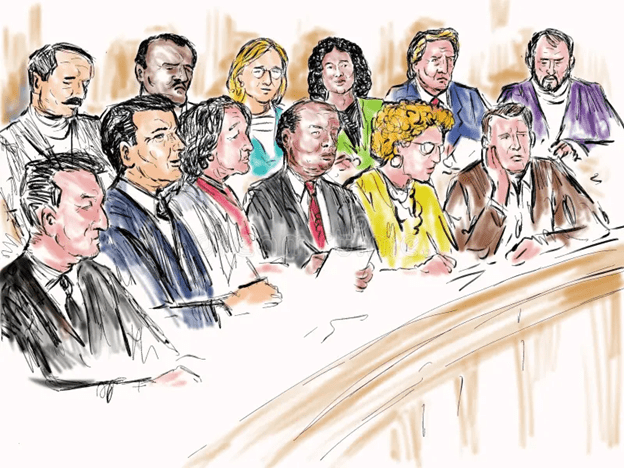
Promoting Generation Z Jury Service
November 6, 2024Feature Article(Source)
Growing up, I had always believed jury service to be a civic chore that every reasonable person sought to evade. I distinctly remember watching an episode of 30 Rock where Liz Lemon (played by Tina Fey) dresses as Princess Leia from Star Wars in an attempt to be dismissed as a juror. Being a juror struck me as a waste of time that prevented working people from attending to their daily lives and obligations. Even worse, you are stuck in a room with people you do not know regarding an issue you probably do not care about, all for very little compensation. Why would anyone want to do this?
Nearing the end of my 1L, I had the fortune of becoming an Eisenberg Research Fellow for Professor Valerie Hans, one of the nation’s leading authorities on the jury system. In assisting Professor Hans with research on emerging jury systems in Argentina, she once remarked to me that Americans selected to be on juries generally have positive experiences and that jury service makes Americans more civically engaged. I was slightly baffled by her remark, but in fact, she has studied these very issues in “Deliberative Democracy and the American Civil Jury.” Professor Hans et al. specifically found that contrary to previous research that stated that only those on criminal juries see boosted civic engagement, civil juries do as well, with some limitations.
Specifically, Professor Hans et al. found that jurors sitting on civil juries with at least one organizational client see more positive engagement in post-service voting than individual parties. She also found that civil jurors who deliberate under unanimous decision rules are more likely to experience a positive change in civic engagement, as opposed to majority rules. Underpinning these findings, selected jurors find benefits in the opportunities jury service provides such as the building of community, from becoming “strangers to comrades through their shared experience even before the jury room deliberation begins.” Moreover, the nature of the claim jurors grapple with promotes self-importance and moral clarity, as they are tasked with enacting justice or seeking the truth, such as in wrongful death claims involving dangerous products.
Despite the many benefits accompanying jury service—to both the individual and the nation—judges are concerned with increasing numbers of individuals ignoring jury summonses. While we can only speculate why individuals neglect their call to civic duty, one judge conjectured that it was because of low respect for the judiciary and declining confidence in our nation. The Institute for Citizens and Scholars corroborated this for Generation Z, noting that individuals in this generation are eight percent less likely to be satisfied with democracy and twenty percent less likely to plan on voting than the national baseline. In light of these findings, it is vital to cultivate the desire to serve within Generation Z, as opportunities to serve may be a critical factor for the long-term health of our nation. Consequently, this article will proceed to address various policy reforms to incentivize jury service within Generation Z.
Increased Compensation for Jurors
The average household income for Generation Z is over $40,000. This corresponds to a daily salary of approximately $109.29. States vary in their compensation structure per juror. For instance, New Jersey jurors’ starting pay is five dollars, and under a pilot program in San Francisco, over 1,000 low-to-moderate-income jurors received $100 a day. If Generation Z cannot appreciate the inherent value of jury service, perhaps increasing juror pay will introduce a new means of attaching importance to civic participation. Courts should consider increasing pay ranges to near the average daily income of Generation Z to signal that the judiciary values jurors’ time and that jury service is a productive use of time.
If no additional funding is contributed to juror salaries, however, juror compensation becomes a zero-sum game in that increasing one juror’s salary may decrease another’s. As such, further research should examine means to increase juror compensation across the board. Courts may also consider alternative allocations of juror compensation such as creating a need-based compensation structure or even considering scaling compensation based on income. In addition to expanding juror compensation, especially if no additional funding is allotted, examining other methods of incentivizing juror participation is critical.
Jury Service Education in Schools
Generation Z may be less interested in participating in jury service because they lack a strong foundational civics education. The No Child Left Behind Act of 2002 re-prioritized schooling objectives to promote raising test scores in math and reading. Social studies instruction, the subject wherein civic education normally falls, consequently dropped an average of 32 percent, with some schools cutting resources for social studies by more than fifty percent. As such, it was no surprise that in June 2024, the American Council of Trustees and Alumni surveyed around 3,000 college and university students on basic knowledge of American history and government and found that young Americans are severely misinformed and lacking foundational knowledge of government. Almost one-third of students think senators serve a four-year term and one-third cannot name the chief justice of the Supreme Court. Perhaps Generation Z is much less civically engaged than their older generational counterparts because they cannot understand its importance. While these findings should inform the education of Generation Z (and younger generations) still within state schooling systems, it is also important to provide this education to those in Generation Z who may be out of school, and who have within the last decade become eligible to serve.
Courts should consider various approaches to instilling in Generation Z the importance of jury service, illustrating that their participation benefits both them as individuals and society as a whole. Maybe those receiving a summons should be directed to information about the importance of jury service. Summonses could even include a pamphlet about civic duty. Courts could consider establishing a social media presence and using various strategies to engage Generation Z virtually. This could include collaborating with influencers or celebrities or creating original content. Further, courts should advocate for additional civics education and could advise on lesson plans within classrooms to promote youth understanding of jury participation importance.
Digital Jury Service Integration
Generation Z was born roughly between 1997 and 2012, a period in which the internet has been omnipresent. The COVID-19 pandemic further demanded that the overwhelming majority of Americans familiarize themselves with technology when school and work became virtual. It would be an understatement to say Generation Z is comfortable in a virtual arena. Workplaces and schools have adapted to hybrid environments in the post-COVID era, and polling reveals that sixty-five percent of Generation Z actually prefers hybrid work models. Generation Z members elect to work in hybrid environments because they simultaneously recognize the value of in-person connections while realizing that some tasks are better suited for work-from-home models.
Courts in all fifty states now offer, in differing degrees, remote and hybrid hearings for both civil and criminal cases. Judges throughout COVID-19 saw increased participation in jury trials with higher response rates than pre-pandemic. Among the benefits gleaned during online jury service were a more diverse jury pool and increased response rates to summonses. This is not, however, to suggest returning to purely remote jury service in the post-COVID era but rather to emphasize that the data collected from virtual jury service during the pandemic can help craft a hybrid system that responds to the advantages and disadvantages of virtual jury service and would provide jurors a more flexible means to participate in jury service. For instance, in response to concerns during the pandemic about the lack of extensive social interaction between jurors, courts could make a process like voir dire virtual but require in-person attendance for deliberations.
Courts then should consider what aspects of jury selection and service require in-person duties and what may be better suited for virtual participation. This would not only appeal to Generation Z because of their preferences for hybrid work but also may allow for more flexible and efficient jury service, allowing jurors to attend to their daily lives while simultaneously exercising their civic obligations.
In all, Generation Z will be eligible for jury service for a very long time, with the oldest in the generation at 27 years of age and the youngest at 12 years of age. It is vital to take proactive measures to ensure that Generation Z and future generations understand the importance of jury duty. For future generations and the younger half of Generation Z, this requires education reform, emphasizing a balanced curriculum including social studies and traditional civics classes. But we also must address those outside school ages, whether it be by providing informational materials via social media campaigns, adapting to hybrid juries, or increasing juror compensation, all with the hope that civically minded individuals will become more invested in the strength and prosperity of our nation.
Suggested Citation: Jessica Rosberger, Promoting Generation Z Jury Service, Cornell J.L. & Pub. Pol’y, The Issue Spotter, (Nov. 6, 2024), https://jlpp.org/promoting-generation-z-jury-service/.

Jessica Rosberger is a 2L at Cornell Law School. She graduated from Cornell University’s
College of Arts and Sciences with a major in American Studies and minors in Inequality Studies and Law and Society, and was admitted as part of the 3+3 Pathway Program. In addition to her involvement with the Cornell Law Journal of Public Policy, she is the President and Founder of the 3+3 Student Association, Vice President of Internal Affairs of Lawyers Without Borders, and Social Chair of the Jewish Law Students Association.
You may also like
- April 2025
- March 2025
- February 2025
- November 2024
- October 2024
- April 2024
- March 2024
- February 2024
- November 2023
- October 2023
- April 2023
- March 2023
- February 2023
- January 2023
- December 2022
- November 2022
- October 2022
- May 2022
- April 2022
- March 2022
- February 2022
- January 2022
- December 2021
- November 2021
- October 2021
- May 2021
- April 2021
- March 2021
- February 2021
- January 2021
- November 2020
- October 2020
- September 2020
- August 2020
- July 2020
- June 2020
- May 2020
- April 2020
- March 2020
- February 2020
- January 2020
- November 2019
- October 2019
- September 2019
- April 2019
- February 2019
- December 2018
- November 2018
- October 2018
- September 2018
- March 2018
- February 2018
- January 2018
- December 2017
- November 2017
- October 2017
- September 2017
- May 2017
- April 2017
- March 2017
- February 2017
- December 2016
- November 2016
- October 2016
- April 2016
- March 2016
- February 2016
- January 2016
- December 2015
- November 2015
- October 2015
- June 2015
- May 2015
- April 2015
- March 2015
- February 2015
- January 2015
- December 2014
- November 2014
- October 2014
- August 2014
- March 2014
- February 2014
- January 2014
- December 2013
- November 2013
- October 2013
- September 2013
- May 2013
- April 2013
- March 2013
- February 2013
- January 2013
- December 2012
- November 2012
- October 2012
- September 2012
- June 2012
- April 2012
- March 2012
- February 2012
- January 2012
- December 2011
- November 2011
- October 2011
- September 2011
- August 2011
- April 2011
- March 2011
- November 2010
- October 2010
- September 2010